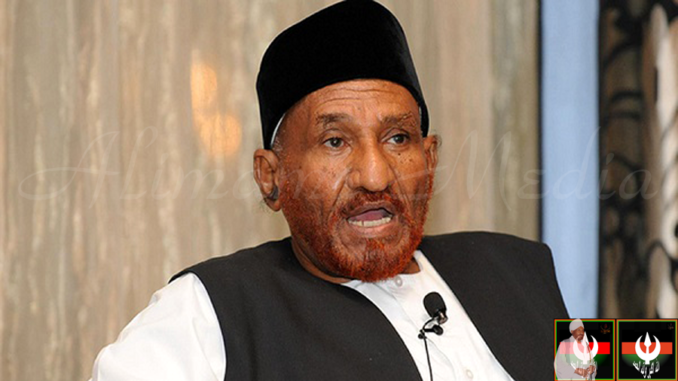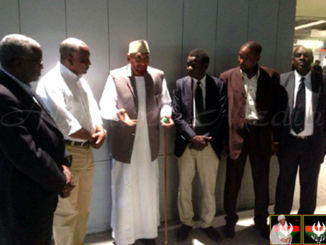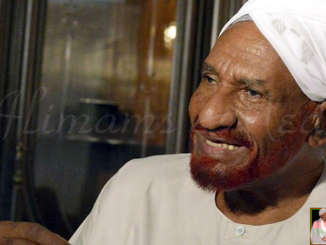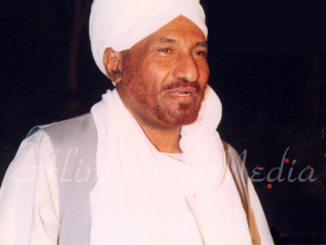
بسم الله الرحمن الرحيم
The Center for Sudanese studies at St. Antony’s college, Oxford University
Friday, 16th of November, 2012
I am so grateful for this third invitation by the Sudan Centre at St. Antony’s College to speak on this most important National issue for the two Sudans, with momentous implications: regionally for the Horn and East Africa; continentally for Africa North and South Sahara and indeed for International Peace and Security.
In a nutshell my message is:
That the balance, between centripetal factors for unity between two Regions of Sudan and the centrifugal factors for separation, favors unity; but the wrong policies in the administration of diversity tilted the balance towards separation.
That after separation, the factors favoring partnership outweigh the factors for confrontation. However, the imperfections bequeathed by the CPA, and ill advised policies will gravitate towards War.
That that War is so devastating, it should and could be avoided in favor of partnership between two Sudans.
That such partnership is inconceivable in the light of current policies, especially in the Sudan, which calls for Regime change.
Regime change by force of arms, even if it is possible, will create more problems than it will solve. Therefore, the alternative is political action, which could lead to either of two terminals: A CODESA-type roadmap, or change in the tradition of the Sudanese formula of October 1964 and April 1985, recently resurrected in Tunis and Egypt.
Now I shall elucidate my argument:
Logic for Unity:
Factors which weigh in favor of unity are numerous. I mention only the most important four:
First: the British authorities during colonial times sought a separate future for the South in terms of the Southern policy pursued since the twenties of last century. For various reasons, in the forties, they decided that the most acceptable alternative for the future of the South, was unity with the North. They guided the Juba Conference of 1947 in that direction, and in spite of reservations expressed by some participants, the Resolution was for unity. The most important basis for that decision was geopolitical.
Second: the second factor favoring unity was economic. The natural market for the equatorial products of the South, e.g. tea, coffee and timber is in the North. Northern products, especially Dura are sought by Sothern consumers.
Third: Between the Northern cattle grazers and the Southern Nilotics, developed soft borders for trade, grazing and intermarriages.
Fourth: to the South, the North constitutes a gateway to North Africa. To the North, the South constitutes a gateway for East Africa. Together they constitute a microcosm for African unity.
Factors of Separation:
Numerous factors weigh for separation. The four most important ones are:
First: a history of oppression towards the peoples of the South.
Second: Modern Northern political consciousness developed without Southern involvement. The South was further alienated by emphasis on Islam and Arabism as a basis of cohesion and aspiration in the North .
Third: Besides the ascriptive diversity between North and the South, an acquired Christian and Anglophone identity, initiated by the colonial power, emerged in the South .
Fourth: In the circumstances, the southern elites, especially after the policies of June 1989 coup d’etat, decided that unity would lead to second class citizenship, and in October 1993 called unanimously, for the first time, for self-determination.
Attempts to Accommodate Southern Interests:
However, whatever the actual and perceived factors, which divided the two peoples of the Sudan, the schism was neither greater than that which separated the Peoples of America, nor that which existed in South Africa. Further, however unacceptable were the relations, there was a continuous and progressive attempt to accommodate Southern interests during Democratic times, namely, the Round Table Conference 1965, the Twelve Man Committee, the All Party conference 1967 and the scheduled National Constitutional Conference of September 1989, which was aborted by the June Coup d’etat. Even during despotic Regimes, there was the 1972 Addis Ababa Agreement, and the 2005 CPA. Both in the CPA and within the opposition NDA, Southern interests were highly represented.
Why Separation occurred?
Such positive developments did not tilt the balance in favor of unity for the following five reasons:
First: the CPA emphasized the following three targets: comprehensive peace, unity, and democratic transformation. Its structure defeated these targets namely:
The first Protocol, the Machakos protocol divided the country upon religious lines thereby laying the foundation for separation.
Instead of sharing National Wealth, the Wealth Protocol divided Southern oil Justifying Separation to make the South keep its own oil to itself.
The Agreement sanctioned the security regulations and institutions of authoritarian government to continue until replaced without making any interim provisions or setting a time limit. The dominant NCP position within the executive and legislative institutions ensured that the undemocratic regulations and institutions would continue unchanged.
The strictly bipartisan division of Power and Wealth alienated all other political forces in the North and the South, particularly the other Armed Groups.
Second: The Agreement simply bypassed a viable Peace settlement in the three Protocols of Abeyi, Southern Blue Nile, and Southern Kordofan. The three issues became time bombs, which exploded in time.
Third: The Agreement, which was conceived as an expression of Comprehensive Peace, failed to address an active war front in Darfur, and set ceilings to disallow the accommodation of any future division of Wealth and Power to respond to the demands of other movements.
Fourth: The Agreement demanded a first world punctuality for implementation, but left so many ambivalent items, which needed much good will between its partners .However, the two were ideologically poles apart, a polarity reflected in their political language , in their internal allies and in their external allies.
Fifth: The two parents of the agreement, namely, Dr John Garang, and Vice President Ali Osman were eclipsed after the agreement. Dr. John because of his untimely and tragic death, and Sayed Ali because it was decided to put him in the shadows.
These faults of omission and commission doomed the fate of the three cherished targets of the CPA, resulting in the three obnoxious situations of: No unity, no peace and no democratic transformation.
The international community was forthcoming in good will, they engaged highly qualified personnel to observe and guard the Agreement, and they spent huge amounts of money to the tune of three billions dollars per year of the UN total budget of eight billions. But because of their uncritical support to the pretensions of the CPA, their acceptance of the bilateral rather than National approach; and their emphasis upon stopping war rather than building peace. Their involvement was much promise but little delivery.
Factors Nurturing the Climate of Hostility
The lead up to Plebiscite was spoilt by further political pollution:
Nothing was done to ensure that the general elections would be free and fair, let the governing parties keep control of their Regions to ensure CPA implementation.
No serious effort was done to settle the unresolved commitments of the CPA before the referendum.
The referendum itself went smoothly, and its overwhelming vote for separation was recognized by the government and peoples of the North.
Despite the declaration of good will and the declared intention that the two states will coexist in good bilateral relations, the carryover from the CPA, and the political signals at the birth of the new State point to a hostile direction; namely:
Declarations in the North that from now on the North’s march towards Islamaization will be categorical, without any room for compromise.
Some officials in the North promising to punish Southerners for their vote. Others with a negative message sighed relief and celebrated good riddance.
Many in the South emphasized Independence rather than voluntary separation to describe their past relations with the North. Others demonstrated a phenomenon known after such separations of enhancing National identity by demonizing the other.
The two states moved in different directions towards participants in the main stage of Middle Eastern War Front between the Palestinians and Israel.
The two states take a contradictory position viz-a-viz the ICC indictments.
Lobby’s, particularly in the USA take a selective position towards the two States.
These factors nurture a political climate of hostility.
Seeds of Actual War
However, there are seeds of actual War, namely:
The Sudan indicated that after the South became a separate State, it should have nothing to do with North/North conflicts.
The South Sudan State considers itself committed to SPLM/A-N who were its partners and whose status can only be settled by a political Agreement which reflects their interests.
The two states take opposite positions over Abeyi.
There are other numerous border differences which should have been resolved during the period of transition, and which could not be resolved by the TBC and are now bones of contention.
Another cause of conflict is the relationship of each state with each other‘s dissidents.
Those five fault lines could easily lead to a general war which will have momentous repercussions.
In 2010, a highly qualified international team formed by the Brenthurst Foundation, led by the ex-Prime Minster of Mozambique, estimated the huge human and material costs of a future war between the two Sudans. It put the figure at 100bn dollars for a ten-year duration. This War will devastate the two Sudans.
Logic of Interdependence
The experience of the year, since the establishment of the Southern State that the two states are interdependent upon each other, namely:
Hostility between the two states will mortgage them to a bunker policy, which will concentrate their budgets on internal and bilateral security to the detriment of development and social services.
Without internal and bilateral stability, there will be no attraction for foreign investment.
Nothing will be able to stop bilateral trade even at the cost of “shoot to kill”.
Any attempt at denying citizenship to each other’s citizens is not practical, and contradicts Human Rights.
Although the Sudan’s economy before oil was not dependent upon extractive resources, the two states with different degrees have become so dependent. The stoppage of oil in terms of action and reaction to pursue economic warfare indicated that the exercise is suicidal.
Nothing would stop the grazing requirements of the Sudanese herdsmen southwards. When circumstances threatened to do so, the tribes simply sought agreements with the Southern authorities.
Even the name of the two states and the Kush symbolism advocates interdependence.
Required Change
In spite of the powerful logic of interdependence, the current policies will drag the two States to war.
If peace is to prevail there must be a radical change in the political situation.
Speaking for the North, I maintain:
Any attempt at a forceful overthrow will create greater conditions of civil war within the fault lines and between the two Sudans.
During this year several fora produced Roadmaps for the desired change, namely:
The Umma Party’s program for a CODESA type of conference in the South African or Latin American tradition for peaceful Regime change. Failing that, to organize massive sit-ins towards a general strike, towards the New Order.
In Doha earlier this year, a select group of Sudanese intellectuals and politicians called for a National Round Table to agree upon a New National order.
The forces of National Consensus have issued a Roadmap for a future New Order.
The SRF, although they will defend themselves against attacks, have decided to support a strategy of political resolution of the National problem.
Many powerful factors inside the ruling party, and among its ex-members are now advocating peace and democracy.
The fallout of democracy in Africa, and the Arab Spring point in the same direction.
UNSC Resolution no. 2046 is a lever in the right direction.
The September Addis Ababa Agreement was not a strategic accord, it was a tactical stop-gap settlement prompted by financial and international pressures. It is welcome as a positive step, but unless it is developed towards the desired National Agenda, it will be derailed.
Finally,
Some of these initiatives would not have been possible without Regional and International good will. However, they tend to concentrate upon those in Government and armed groups. Their involvement is necessary for the Peace Process.
The Sudan has a mature body politic, and an advanced civil society. They have been systematically absented from all previous Peace processes.
The next time round, the Regional and International communities should pursue the comprehensive National approach in the interest of viability and efficient implementation.
Thank you for listening




